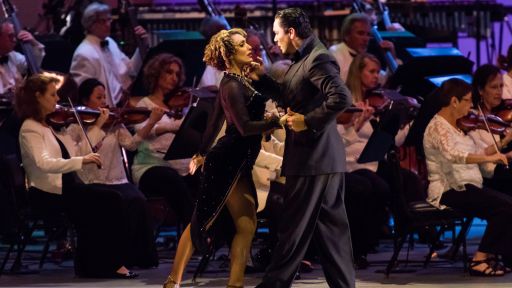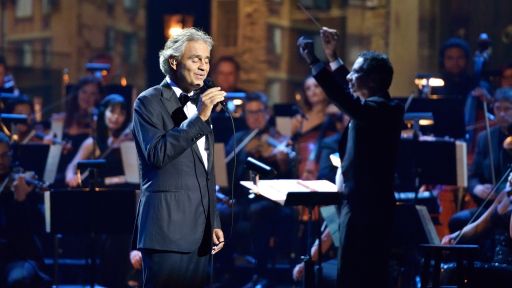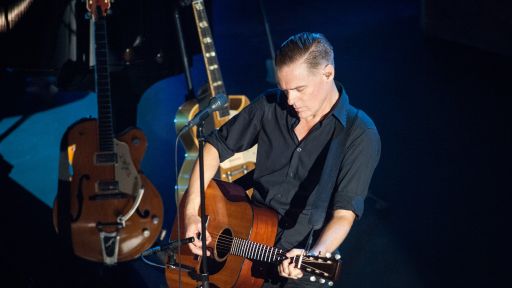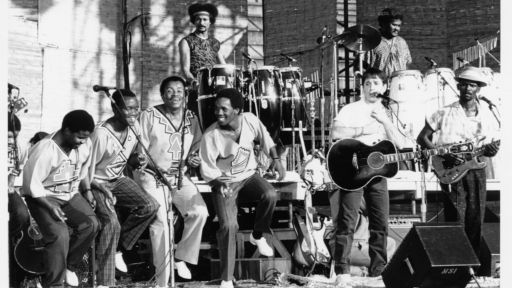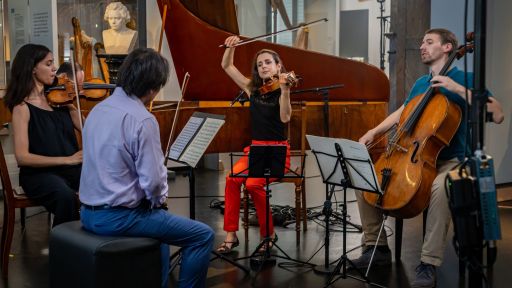Premieres Friday, April 19 at 9 p.m. on PBS (check local listings), pbs.org/gperf and the PBS app
Places visited: Parma, Italy; Las Vegas; Nashville; New Haven, Connecticut
Explore the work of two legendary virtuosos, Niccolò Paganini and Robert Johnson, along with stars of today, Augustin Hadelich and Keb' Mo'. Joined by Cirque du Soleil acrobats, discover the secrets of being a virtuoso.
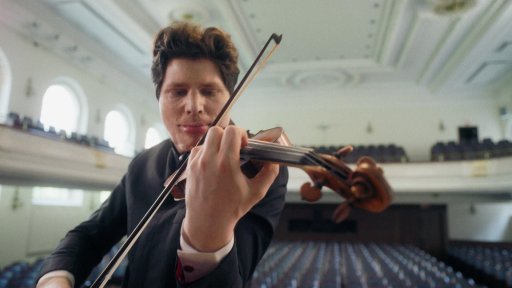

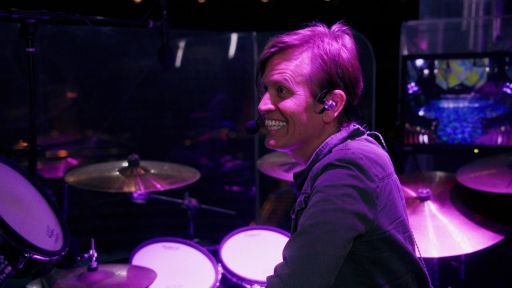
♪♪ -I'm Scott Yoo.
Last time on "Now Hear This," I met promising kids.
♪♪ Now I'll look at who they hope to become -- virtuosos.
♪♪ Nicolo Paganini was the greatest violin virtuoso of all time.
He wrote fiendishly difficult show pieces that have tormented mortal violinists since.
I'll take a deeper look at Paganini with one of today's great violinists.
♪♪ It's so jarring, right?
♪♪ I'll go to Paganini's home turf in Italy to understand his upbringing... That technique was actually invented at almost a century earlier.
...and his environment.
Wow!
This is definitely food as art.
I'll get to know great performers in other styles... ♪♪ ...and great performers in other art forms... How did you feel when you won the world championship?
[ Laughter ] ...to explore what it means to be a virtuoso today.
-When you hear great music, it really does transcend.
-So for you, virtuosity is about opening your heart.
-Yeah.
-In the end, this journey would change my thinking about Paganini and virtuosity itself.
Up next, on "Great Performances," join me to look at virtuosos.
♪♪ ♪♪ Major funding for "Great Performances" is provided by... ...and by contributions to your PBS station from viewers like you.
Thank you.
-The virtuoso.
Audiences marvel, but critics can be split.
Is the virtuoso more flash than substance?
After being punished by Paganini's music in my early career, I'd have to say, that was my opinion.
But at Yale University, I went to visit Augustin Hadelich, one of the great violinists of our day, who's a champion of Paganini.
♪♪ Paganini.
I mean, every violinist knows Paganini, worships Paganini, fears Paganini.
But many people don't know who he is.
-It's true, but it was once very different.
For the first 35 years of his life, he just toured in Italy and became very well known.
Then suddenly, he started touring in the rest of Europe, and he went to London and Paris and Germany.
It was such a phenomenon that every composer, every musician, had to go see him.
Even people that we don't think have any connection to Paganini, they went to see him.
Schubert went to see him.
It was just for a few years that he toured everywhere, and then he retired.
But in those few years, he cemented this reputation as being the greatest ever.
Of course, we don't have recordings, but what we do have is some of his music, which is still among the hardest stuff ever written.
I have this question that I ask myself sometimes.
Did he make it even harder when he was going to publish it?
Just so that people would be... To further this legend of the great Paganini, who's untouchable.
-Want to play some?
-Sure.
-Okay.
Great.
♪♪ ♪♪ ♪♪ What does it take to become, and remain, a virtuoso?
I decided to investigate, by looking at great performers across styles and art forms.
♪♪ ♪♪ ♪♪ I'd start in Las Vegas with some of my favorite performers, the acrobats of Cirque du Soleil.
♪♪ Allister Booth, a former artist, is now their lead trainer.
Allister, when I first came to Las Vegas, everybody said, "See Cirque du Soleil."
I saw it and my jaw was on the floor.
Where did these people come from?
-We hire the best in the world.
The people we get are at the top of their game in whatever field they came from, like gymnastics and sports acrobatics, trampoline.
South America and Eastern Europe still have a big traditional circus culture.
So sometimes we get people from traditional circus families.
-Really?
What are you going to be training these guys to do today?
-We have the teeterboard, the power track, and later on, we're going to do the colonne, which is where they stand on each other's shoulders.
We'll launch a girl up onto the top.
-It's dangerous work.
-It is dangerous what we do, yeah.
So we take a lot of precautions to make sure we minimize the danger as much as possible.
When we're in training, sometimes we use safety lines.
I'll be holding the other end of the safety lines while they're learning the new skills.
-Okay.
See you over there.
-See you over there.
-I'm sorry, but just standing on somebody's shoulder...
Forget catching somebody.
Just standing on somebody's shoulder is difficult.
-She's learning how to do this.
-Eventually, you do this without this?
-Correct.
-I mean, this is like catching a bullet in your mouth, essentially, right?
-There's a lot of timing, and angles, and repetition.
-Ohh!
[ Applause ] Wow.
I'd follow Sarah Turner, one of Cirque's greatest athletes, over a day of preparation and performance.
Oh-oh!
[ Clapping ] Wow.
-Want to try?
-[ Laughs ] But first, I was off to the Emilia-Romagna region, home to some of Italy's greatest food -- and that's saying a lot.
Paganini was born in Genoa, but this is where he made his home.
I'd start in the workshop of renowned luthier, Gabriele Lodi, who makes the instruments for guitarist and composer Giacomo Susani, to learn about Paganini's favorite instrument.
I was surprised to find it's not the violin.
-Here we have a Gennaro Fabricatore guitar.
The same guitar was in the hands of Paganini's.
The ornamentation, floral design, glued to the top on both sides of the bridge.
A fingerboard development that works on the same plane of the top.
But this guitar show us the greatest revolution of Fabricatore.
For the first time in history, we find six single strings in order to have a guitar which collects two octaves from the first to the sixth.
-It's like a small piano because you can have counterpoint, you can have chords and very rich, complex sounds.
It's much easier to be a virtuoso on this instrument.
-Yes, right.
Honestly, in this guitar, it's possible to move and practice as a modern guitar.
This never happened before.
-Paganini cared so much about his guitar that towards the end of his life, when he went broke, unfortunately, he sold all his instruments.
-Because he gambled it all away.
-Yes.
He sold all his instruments, except his Fabricatore guitar.
-This was his prized possession.
-Exactly.
-I'd love to hear this instrument.
-Absolutely.
-Giacomo took me to the Teatro Comunale in Carpi.
♪♪ ♪♪ ♪♪ ♪♪ Beautiful.
-Thank you.
-Great sounding instrument.
-Yes, it is.
-It's nice.
-It's particularly beautiful to hear it in this wonderful theater, a theater that looks very much like one of the venues Paganini would play in at his time.
-He traveled from place to place, Paris, Rome, wherever.
-Exactly.
He would play in very big, important, famous places, and then smaller theaters like this one, for example.
-It's almost like a political campaign.
He's building the legend of Nicolo Paganini.
-And one of the reasons why we remember him today is actually because he was able to do so.
-Here was my first pointer on virtuosity.
No matter their talent, virtuosos must work to build their reputation.
I went to the Museum of African American Music to look at another traveling musician, perhaps the greatest bluesman of all time, Robert Johnson.
My host was 7-time Grammy winner, Keb' Mo'.
-Son House said that Robert Johnson was a nuisance.
-Why?
Because he just played badly?
-He played badly.
Then one day, he disappeared for a while, and he came back in and blew everybody's mind.
He all of a sudden became this virtuoso while no one was looking.
How did he get that good, that quick?
-Didn't some people say that it was just a deal with the devil?
They said that about Paganini.
-What's the devil?
-They said that he played impossibly well, so he must have made a deal with the devil.
It's probably just a way for people to explain the unexplainable.
You just say, "Deal with the devil."
-But the devil is not a devil with a tail and horns.
It's your fear.
It's your own devil inside of you, stopping you from being your best and highest self.
-Do you think virtuosity is also about facing fear?
-It's multi-level.
Facing fears, willing to get up and practice every day, willing to not quit, and willing to be open and to understand that it has nothing to do with skill.
It has something to do with being able to open your soul, open your heart, and communicate.
When you hear great music, it really does transcend.
-So for you, virtuosity is about opening your heart.
-Yeah.
I know when I heard Robert Johnson, I heard a guy that just wasn't afraid to express himself in a unique way.
♪ I got a kind-hearted woman ♪ ♪ Do anything in the world for me ♪ ♪♪ ♪ You know I got a kind-hearted woman ♪ ♪ Do anything in the world for me ♪ ♪♪ ♪ But these evil-hearted women ♪ ♪ Just won't let me be ♪ ♪♪ ♪♪ ♪♪ -This was an element of virtuosity I hadn't really considered -- the importance of knowing yourself, and having the courage to communicate your true self to your audience.
-♪ Yeah, you know, but these evil-hearted women ♪ ♪ Whoa, they just won't let me be ♪ -Back at Cirque du Soleil, I met Sarah the afternoon before the show.
In this field, she's definitely a virtuoso, and I wanted to know her experience.
Sarah, do you always put on your own makeup for a show?
-Yeah.
This was the hardest aspect, to be honest.
When I came, I was already an acrobat.
I could do acrobatics, but I was never much of a big makeup person, so this was more nervous for me than the acrobatics.
-Do your children want to wear makeup like their mommy?
-Of course, they do, yeah.
-Do they?
-Yeah.
-Do you let them?
-No.
Not yet.
[ Both laugh ] -Are they gifted athletically like this?
-Yes.
-They're twins?
-Yes, I have twin girls.
-Seven years old?
-Seven years old.
-Have your parents seen your show?
What did they think?
Are they scared, or are they just thrilled?
-My mom's thrilled.
My mom was my biggest supporter.
Even in gymnastics, she would come and watch.
She'd stay for all my trainings, and come to all my competitions, nationally and internationally.
My dad didn't like it because he felt like it took me away from the family, because I was training a lot and not in the home.
But when I became world champion, he was very proud.
-Sure.
How many people can say that?
-Then he loved it.
-That's similar to music, too.
For every great young pianist, there's a whole family, there's so much sacrifice.
I mean, It's universal, right?
In human experience.
-Yeah.
-How did you feel when you won the world championship?
-The first time, I think, I didn't expect it.
I was 13, and I didn't realize how good I was.
I just went, and I did -- I did my runs, and then I won.
-Wow.
-Yeah, it was amazing.
Then the second time, when I was 15, that was more pressure because then I knew -- -There was a target on your back.
-Yes.
Everybody knew who I was by then, everybody knew.
There was a lot that was different, that world championship.
I wanted to quit so many times, but then I went and I won.
-What you do every day now as a part of Cirque du Soleil, it's so different because you're an individual performer, but it's absolutely teamwork as well.
-Yeah, because you're so tight knit.
My catchers, I have to have a bond with them because they essentially save my life every day.
If I don't think that they care about me or that we don't have a good bond, I'm not going to have the confidence to jump to them.
We depend on each other.
-Wow, that's profound.
-Yeah.
-Outside Parma, I went to look at my other favorite art form: food.
In Italy, there's certainly excellence in that.
Here, I visited a cheese dairy with chef and food writer, Ilaria Bertinelli, where they make Parma's most famous product, Parmigiano Reggiano.
Well, there are a lot of cows here, Ilaria.
-Yes, a lot of cows, but happy cows.
-Grass fed.
-Exactly.
And it must be grass that grows in this very area because on the grass, there are three lactic bacteria that are the ones that we want to keep alive throughout the production process, and you find them only here.
-This cheese is of this area.
-And nowhere else.
Look at the cheese.
-Whoa!
♪♪ -It's an artisan process.
The people work with their hands.
They feel, they watch, they smell.
Everything is decided depending on what happens in the vat.
A little bit like a chef.
Every minute, you decide what to do.
♪♪ Notice that when they do this, the cloth is perfectly smooth, because if there were creases on the cloth, the surface of the cheese would have a scar, and that would cause a defect that would make it be rejected at the end of the process.
-Parma is also famous for its cured meats.
Ilaria took me to the tiny village of Zibello to look at culatello.
It's prosciutto taken to the next level.
He's not only a butcher, he's also a seamstress.
[ Conversing in Italian ] -In Italian, this is called imbrigliatura, which may translate more or less like harnessing.
-Judging from his facility in doing this, this looks like he's breathing.
It's so easy for him.
How many times has he done this?
-Riccardo has been doing this for 17 years.
The tying operation is the longest operation.
Riccardo and his colleagues spend hours every day tying culatellos.
-You have to be extremely precise.
I mean, this business rewards perfection.
-It's true that it is the details that make the difference in the product.
Because every little operation has got a consequence.
-Ecco fatto.
-Fantastic.
-That's it.
-Beautiful.
-Completo.
Finito.
-Finished.
-This culatello will now hang in the cellar for over a year, curing with the natural yeasts that grow only in this area.
It was time for us to taste the result.
-These are three culatellos: 18 months, 24 months, and 38 months of maturation.
-Look at how dark it gets by 38 months.
-Incredible.
We start from the youngest one.
We wrap, we feel, we smell, and we enjoy it.
♪♪ -Delicious.
-Are we ready to taste -- -26 months.
Here we go.
-26.
-It does feel drier.
-It does.
-No question.
-This is the reason why you have to eat it with your fingers, to feel the texture.
Because you're already there, you judge.
♪♪ -The difference between this and this...
I mean, this was delicious, but this is astonishing.
It's incredible.
I mean, it is so rich.
-There is one year in between.
Most of the other food products in one year would have been produced, disappeared and -- It's really like two different products.
You smell the cellar, and the flavor, and it melts in your mouth.
-The incredible combination of perfection and patience that's required for somebody to get to eat that.
♪♪ Mm.
♪♪ [ Laughing ] I don't even know what to say.
-Parmigiano is inspected when it is 12 months old.
The inspectors come here with a hammer.
They listen to the music of Parmigiano because if the cheese mass inside is compact, it means the cheese is premium.
If it sounds hollow, it means there are openings inside, and that cheese cannot have the name Parmigiano Reggiano.
-I guess that's why it's famous.
These people are holding themselves to world class standards all the time.
♪♪ Oh, I see it.
It's separated.
-You see?
Yes, yes, yes.
-Ah!
Wow.
That's so cool.
-That's it.
-Wow!
-You see the grainy texture on the product.
-Nice, nice, nice.
Oh!
-You go, Scott.
Try it.
Put it close to the nose and you enjoy.
[ Speaking Italian ] Mm?
-Wow.
-Mm.
-Mm.
There are many layers of flavor.
-Yes.
-It's not dry.
-Not at all.
-It's very chewy.
-But I'm curious to know if you have ever tasted something like this.
-No.
This is definitely food as art.
-It is.
-For Parma's artists and producers, as in music, virtuosity requires a commitment to quality -- and a great commitment of time.
In Connecticut, I met Augustin on a rare day home.
Augustin, how many days of the year are you on the road these days?
-I think it's over 300 days.
I'm traveling constantly.
-Of course, when you're there in Hamburg or in Denver, they're expecting to hear the Augustin Hadelich that they've heard on a recording, right?
-Yeah, the pressure is always there to be your best at every concert, because people don't care what you did last week.
They're coming to the concert today.
-Augustin, I was watching a video of yours, and I thought, "Why does Augustin Hadelich, one of the great violinists of the world, why does he make videos?"
-It was actually during the pandemic lockdown that I started this video series called "Ask Augustin," because I sometimes get questions from students or from audience members about music, about violin technique.
It became a very meaningful part of what I do, that I give these little video master classes.
-Nice.
We should make one.
-Okay, let's make one right now.
-Okay.
There's a camera right there.
-Let's do it.
Welcome to another episode of "Ask Augustin."
Today, it's all about Paganini and his genius, his revolutionary violin technique.
We're going to talk a little bit about the 24th Caprice.
I've got here my friend, Scott Yoo, the violinist and conductor, who is joining me here to nerd out a little bit about Paganini.
-One thing I love to think about when I think about Paganini, the violin is really good at playing one note at a time.
♪♪ But two notes... A little harder.
Three notes... ♪♪ really quite difficult for us.
So you have variations in the 24th Caprice.
Every single note is three notes in a row.
How do you cope with that, Augustin?
-I think it's hard for the left hand because you have to crawl around and shift all the time.
To keep that clean is so difficult.
But I actually think that Paganini, who had Marfan syndrome, which is a health condition that has a lot of health problems that come with it.
But one of the effects that would help a violinist is just how flexible the fingers and joints are for people with this condition.
There are many times when normal violinists, like us, we have to shift constantly back and forth between the positions of the instrument, when Paganini could actually just stretch back and forth with an ease that most people just can't get there.
Then to play the notes together, it's already hard.
For many years, violinists used to usually just play it pretty chopped up like that.
-That's how I learned it.
-That was always the way to play it.
-Sure.
-But Paganini has a slur, so he wants like... ♪♪ This is a lot of difficulty for the bow as well because you can't really play the three notes continuously.
[ Sour note plays ] You would end up crushing the sound.
You have to actually break it in such a way that you don't really notice.
♪♪ -After you've contorted yourself with the left hand, then the very next variation... ♪♪ I think that's so inventive.
Here, Paganini is using the violin... -Like a guitar.
-Yeah, like a guitar.
Even if you know nothing about the violin, it's so jarring, right?
-This is probably the variation that gets the biggest reaction.
People are just so startled by it because when you really are very dramatic about the previous ending, and then... ♪♪ ♪♪ -For those of you watching who are not violinists, we, violinists, are raised to...
The left hand doesn't make any noise.
It just changes the frequency of the sound.
♪♪ Suddenly, the left hand is producing sound.
-Then, of course, once you are Nicolo Paganini, people expect that, then you have to outdo yourself.
It's such a beautiful moment, so after... ♪♪ ♪♪ ♪♪ Such a sweet theme.
It couldn't be a bigger contrast.
-Such imagery.
-Yes.
There were so many elements that now we think this is part of what a great violinist needs to do, is to sing on the violin; is to communicate; is to have a lot of character in their playing.
-So he's not just a virtuoso, he's not just an inventor, but he's also a playwright.
He's dealing with the drama of the variations.
Cirque's acrobats move at superhuman speed.
I wanted to talk to the guy with a challenging job of making music for their performances, Aaron Guidry.
I've been thinking a lot about Paganini, so I dusted off this old Paganini exercise, a Caprice, that I had won a competition with when I was a teenager.
It's very hard because he makes you play a duet... ♪♪ ...except he has you play a duet with yourself.
♪♪ Usually, when you do that, those are octaves, you do one... index-pinky.
But it's going too fast.
So you have to do index-ring finger.
Middle finger-pinky.
-[ Laughs ] -So you have to have daddy long legs fingers in order to pull this off.
Let me show you a little bit.
-Alright, go for it.
♪♪ ♪♪ ♪♪ -Okay.
Anyway, that was more or less.
But I'm actually interested in what you do, because you have musicians on this side of the stage.
You have singers, and then all the way across, you have more.
-I know.
-It's just nuts.
There's so much going on.
Basically, my job as the musical director is to make sure that we have music, and make sure that music lines up with what's happening on the stage.
But it's always a little bit different.
It's always a little bit different because the acrobats make it a little bit different.
We, as the band, have to react to that.
Maybe I need a little bit more improvisation tonight, or we're pulling this section out tonight, or whatever we're doing, but it's all done live and in time to make it happen.
-Show me.
-Alright, check it out.
-Okay.
-Hey, guys.
Let's start at the tension in "Fast Bungee."
Stand by.
Tension, two, three.
♪♪ ♪♪ Break, two, three, and... ♪♪ Voice, two, three.
♪♪ Build, two, three, and... ♪♪ So that's an example of the end of one of our acts, the Bungee Act.
-So you're watching what's happening.
-Definitely.
-The acrobats are taking their cues from the music, correct?
-A little bit of both.
A little bit of give and take.
For example, when Sarah, at the very last trick of Planche, the music gets all tension, you see that teeter board going, and you see there's a guy, there's a guy on his shoulders.
You know something's coming.
You see Sarah getting up there.
Here she goes.
She's about to get on, I count to three.
That's super important.
One, two, three.
I hit this pad, and that cues the band for a break, two, three, and boom.
And we stop, and she's landed, ta-da.
And the crowd goes bazonkers.
-You count to three because, in your experience, that's the amount of time she needs to get from the board onto somebody's shoulders.
-Yes, three plus another four for the band to be cued, so it's seven total.
-Really?
-So if she gets on early, then I subtract.
If she gets on later, I add.
We're going to pretend like she gets on the board.
I'll cue you because you're going to do it, alright?
-How am I going to do that?
-You're going to come over here and hit this golden pad.
-That thing?
-Yes, exactly.
-Here we go.
-Stand by, everybody.
Let's start at the tension.
Here we go.
Tension, two, three.
♪♪ ♪♪ Stand by.
Stand by, Scott.
It's getting close.
Here she comes.
Go.
One, two, three.
Three, two, three, and... Nailed it.
-Whoa.
-That's the timing that you have to do.
Those examples, that little example, all over the show.
-I got to tell you, as somebody who's seen this show a bunch of times, I mean, I'm a musician, but even for me, it never occurs to me that somebody is doing that.
-You're doing that.
-Yeah.
The man behind the curtain.
-It is so much more thrilling because you're doing that, because the music is synchronized to the action.
-That's the greatest compliment, to say that it sounds super smooth.
-It's true!
It's totally true.
-I appreciate it.
♪♪ -If I agreed to go to Nashville City Cemetery, at night, Keb' Mo' said he'd tell me the secret of how Robert Johnson mysteriously disappeared then returned a virtuoso.
-♪ My mama dead ♪ ♪ Papa's well to be ♪ ♪ Ain't got nobody to love and care for me ♪ ♪ You got to come on ♪ ♪ In my kitchen ♪ ♪ 'Cause it's going to be raining outdoors ♪ ♪♪ ♪ Oh, how the wind do howl ♪ ♪ Can you see the wind howl?
♪ ♪♪ ♪ You got to come on ♪ ♪ In my kitchen ♪ ♪ 'Cause it's going to be raining outdoors ♪ ♪♪ ♪ I know she's gone ♪ ♪ She won't come back ♪ ♪ I took the last nickel out of her nation sack ♪ ♪ Yeah, you got to come on ♪ ♪ In my kitchen ♪ ♪ 'Cause it's going to be raining outdoors ♪ ♪♪ -So why really are we in a cemetery?
-Well...
I guess we'll all end up here someday.
[ Both laugh ] But this is supposedly where, those two years when Robert Johnson disappeared, that he went off and studied with a gentleman named Ike Zimmerman.
-In a cemetery?
-In order for him to go have a quiet place to practice, there was a cemetery next to his house, so he would take Robert over there.
-This is like a practice room for him.
-It was a practice room, yes.
It was close by.
Supposedly, Ike taught Robert everything he knew, and Robert eventually surpassed him.
Clearly, Ike saw the potential of Robert where no one else did.
Unless the devil just put some devil juice on him.
[ Both laugh ] -What did he learn from Ike?
-Ike was never recorded, so no one knows what Ike sounds like.
I would guess that Robert plays like Ike.
-You're saying something really interesting and important here, which is that a virtuoso is not one plus zero.
A virtuoso is one plus one.
It's the virtuoso and the virtuoso's instructor.
You got to have a virtuoso instructor as well.
-Or instructors.
-Mm.
Turns out behind Robert Johnson, like every other virtuoso I'd met, was a talented teacher who inspired him.
It was the same for Paganini.
I met Giacomo again in Parma, in a church run by the Music Conservatory.
I was doing some research on Paganini, and I was shocked by how important Parma is in his life.
He studied with a teacher in Genoa.
The teacher said, "I've taught you everything I know.
You better go to my teacher in Parma."
He goes to that teacher.
That teacher says, "You're better than me.
You better go to this teacher."
Then he goes to another teacher.
Then finally, that leads him to Locatelli.
I didn't know that Locatelli was born 80 years before Paganini.
I checked it out, and I got to the seventh Caprice, and my head almost exploded.
Everybody knows the Paganini first Caprice, or every violinist knows, because it's the first one in the book.
♪♪ Then I looked at Locatelli's seventh.
♪♪ I mean, it's practically the same piece.
Pretty similar.
-It's basically the same, yeah.
-When I was growing up, my teachers told me, "Oh, Paganini, he invented all the tricks for the violin," which might be somewhat true, but definitely in the case of the first Caprice, that technique was actually invented almost a century earlier by Locatelli.
-That's fantastic.
It's a great story because it makes you realize how much everyone learns from others, from the past, from the present.
And Paganini was one of us -- he was a musician who learned.
It's also great to think about what everyone learned from him later in the future, the legacy he left.
Even us as guitarists have a lot of repertoire that pays homage to his music.
There's this piece by Castelnuovo-Tedesco.
It's called "Capriccio Diabolico," diabolical caprice.
It's got a very strong link to Paganini.
So much that the composer named it "Homage to Paganini."
Here's a little section.
♪♪ ♪♪ ♪♪ ♪♪ -By now, I was starting to think of Paganini differently, no longer as a freakishly talented anomaly, but as an integral figure in our larger musical fabric.
♪♪ ♪♪ ♪♪ ♪♪ At Cirque, Stage Manager Julie Maury and her team run the show each night.
This looks like Mission Control for NASA or something.
-It sure is.
This is our automation station.
-I've been watching the acrobats, and they're just geniuses.
-Mm-hmm.
-But there seem to be a lot of you just making everything happen from behind the scenes.
Tell me about what you do here.
-Absolutely.
To run the show itself, it takes 35 technicians and stage managers, and that includes automation, lighting, rigging, projections, carpentry, props, wardrobe, and every little bit that each person does is what enables us to do this night after night.
We do this show twice a night, five days a week, 48 weeks a year.
-480 shows a year.
-480 shows a year.
Actually, I'm about to call the show now.
Would you like to watch?
-Sure, please.
-Alright, let's do it.
-Okay.
-This is like a communication control.
Using this, I can decide who it is that I want to speak to.
-To which department.
-Yeah.
-Okay.
-Right now, I'm about to speak to Aaron.
Hey, Aaron.
No changes for second show.
-Sounds good.
-Have a good show.
-Can't wait.
Stand by... -One, two, three.
♪♪ -So...this accordion is opening in the ceiling, and this drum is coming in, the odaiko.
♪♪ ♪♪ ♪♪ Stand by window, cue 135, and a clear for lift D. ♪♪ ♪♪ Cue 140, go.
♪♪ ♪♪ Next up is Mai's Tissu act, stand by, doors.
Thank you.
Cue 251, go.
♪♪ Cue 253.
-Thank you for letting me watch you work.
This is fascinating.
-Absolutely.
Happy to have you.
-I'm going to go downstairs.
♪♪ I was looking forward to a backstage experience of the performance.
But in Parma, I was headed to another cemetery to get the real story from none other than Nicolo Paganini.
No, not this one.
This one.
Paganini's great, great, great-grandson.
With him was translator Cecilia Rosso.
-Playing the violin and having a name such as Paganini is a hard thing to do.
-My understanding was that Paganini had Marfan syndrome, which made his fingers very long, and he was very flexible, and he could play anything on the violin.
But it also weakened the vessels and arteries inside his body, which ultimately led to his death.
Is that true?
No?
That's interesting.
It was rumored that he was a big gambler, and he had financed a casino in France which failed, and he ended up having to sell a bunch of instruments, and it really affected him.
Is that true?
When Paganini died, he left a five-story country villa to his heirs.
Nicolo's family lived here until World War II.
He took me to the house, which is now a convent, for a little picnic.
We're sitting here in front of Paganini's villa.
Obviously, this is a very wealthy person that could afford a house like this.
How many concerts did he play in a year?
Wow.
So he's a conductor, he's also a teacher, then also, he was his own impresario.
He was promoting himself.
I thought I knew Paganini, but I hardly did at all.
He probably didn't have Marfan syndrome.
He clearly didn't gamble away his fortune.
And his dedication was as spectacular as his talent.
I was ready for a change of heart.
-I feel like Paganini is often misunderstood, because people think of him as this guy who just wrote really hard violin music, and all the flashy stuff.
But there's so much more to him, and he wrote such beautiful operatic melodies, just like Italian opera of the 19th century.
Actually, the slow movement of the first violin concerto, it's completely opera.
-All the tremolo.
♪♪ -Yeah, yeah.
-It's like opera.
♪♪ ♪♪ -Everything is sort of, like, heart on your sleeve.
It's very intense and operatic.
-I know you have a video of that.
-Yeah, yeah.
♪♪ There's so much more to him.
I think he was such a deep musician, who wrote music that was so emotional, lyrical, singing.
Everything is so intense.
♪♪ I think Paganini in Italy is thought of just as one of the great composers.
Whereas here, people think of him as this very specialized figure who is just -- -Typecast here.
-Typecast, yeah, exactly.
-But maybe no longer.
-I hope he's more and more appreciated for this side.
♪♪ -Paganini, I now believe, was the very definition of a virtuoso: a once-in-a-generation performer, who worked tirelessly to build a career that was true to his remarkable self.
♪♪ And his music is much more full of life than I had recognized.
I met Giacomo one last time in Parma's Paganini auditorium, so we could play some together.
♪♪ ♪♪ ♪♪ ♪♪ Pretty simple violin part for a Paganini piece.
-Yes, it is.
It is indeed.
There is a good reason for it, you know, because Paganini was commissioned this piece by a violinist, and this violin player asked him to join him on stage with the guitar.
And Paganini couldn't resist the idea of being the most important man on stage, and so he wrote this beautiful part for the guitar for him to play, and left the violinist with this simple accompaniment.
-[ Chuckles ] Well, he had a sense of humor.
-Indeed.
-Let's play the other piece that has a little bit more for the violin.
-Yes, of course.
♪♪ -Back at Cirque, the acrobats were rounding out their show, and I was in the best seat I'd ever had.
-Hi, Scott.
-Hi.
♪♪ [ Applause ] Are you getting ready for the next skill?
-The next cue.
-The next cue, which is?
-Rainsticks.
-Rainsticks.
Wow.
-Yeah, another cue after.
Then straight after this, we'll come back, I'll do a quick change.
Then go straight into Planche.
Teeter board.
♪♪ -Oh!
[ Clapping ] -They're so good.
-They are so good.
♪♪ I guess you got to go.
-Yeah.
-Okay, good luck.
♪♪ [ Cheers and applause ] ♪♪ ♪♪ You know, when I watch Mystere, and I see the curtain calls, I feel like the performers are almost doing it as much for each other as they are for the audience.
♪♪ I find it so refreshing that these people who are so seasoned still have that essence.
-Yeah.
-It inspires me to try to do my own work better.
I look at these people and think, "Wow, look at what's possible."
It's fantastic.
♪♪ [ Cheers and applause ] -Cue 320, go.
Stand by, cues 330 through 350.
Stand by, lock A.
♪♪ ♪♪ -It was almost time for Sarah's biggest trick, and I was already getting nervous.
♪♪ ♪♪ Even the greatest virtuoso sometimes miss.
Much more than a wrong note.
For Sarah, that could mean injury or worse.
Talk about facing your fears.
[ Cheers and applause ] Oh!
Oh!
♪♪ ♪♪ [ Cheers and applause ] That's one of my favorite moments of the show.
No matter the art form, virtuosity is so much more than dazzling talent and skill.
♪♪ Virtuosity is years of dedication.
It's persevering despite failure.
It's communication, and trust, and caring between collaborators.
Virtuosity is an attitude that the impossible is possible.
When these things come together, on a stage, a playing field, or at a table, it's an act worthy of celebration.
I'm Scott Yoo, and I hope you can now hear this.
♪♪ ♪♪ -To order "Now Hear This" on DVD, visit ShopPBS or call 1-800-PLAY-PBS.
This program is also available on Amazon Prime Video.
♪♪ To find out more, visit pbs.org/greatperformances, find us on Facebook and follow us on X.
♪♪ ♪♪ ♪♪
